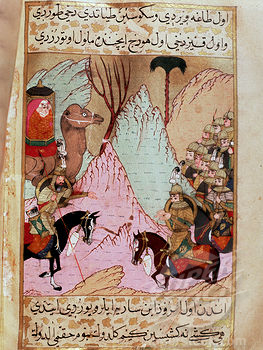Islam and politics
Enlarge text Shrink textPolitical aspects of Islam are derived from the Islamic religion, which is based on the Quran, ḥadīth literature, and sunnah (accounts of the sayings and living habits attributed to the Islamic prophet Muhammad), and elements of political movements and tendencies followed by Muslims or Islamic states throughout the history of Islam. Traditional political concepts in Islam which form an idealized model for Islamic rule, are based on the rule of Muhammad in Mecca (629–632 CE) and his elected or selected successors, known as Caliphs in Sunnī Islam and Imams in Shīʿa Islam. They include obedience to the Islamic law (sharīʿa); pledging obedience to rulers (al-Bay'ah) with a corresponding duty of rulers to rule justly and seek consultation (shūrā) from their subjects; and the importance of rebuking unjust rulers, unity, solidarity and community, superseding individual rights and diversity. According to the French political scientist and professor Olivier Roy, "Classical Islamic thought is overflowing with treatises on governing, advice to sovereigns, and didactic tales. They do not reflect on the nature of politics, but on the nature of the good ruler and of good government (advice, techniques, paradigms, anecdotes)." A significant change in the Muslim world was the defeat and dissolution of the Ottoman Empire (1908–1922). In the modern era (19th–20th centuries), common Islamic political themes have been resistance to Western imperialism and enforcement of sharīʿa law through democratic or militant struggle. Events such as the defeat of Arab armies in the Six-Day War and the subsequent Israeli occupation of East Jerusalem and the rest of the West Bank (1967), the Islamic Revolution in Iran (1979), the collapse of the Soviet Union (1992), the end of the Cold War, and the fall of communism as a viable alternative have increased the appeal of Islamic movements such as Islamism, Islamic democracy, Islamic fundamentalism, and Islamic revivalism, especially in the context of the global sectarian divide and conflict between Sunnīs and Shīʿītes, along with the popular dissatisfaction with secularist ruling regimes in the Muslim world.
Read more on Wikipedia >
 Topic
Topic







